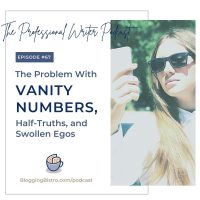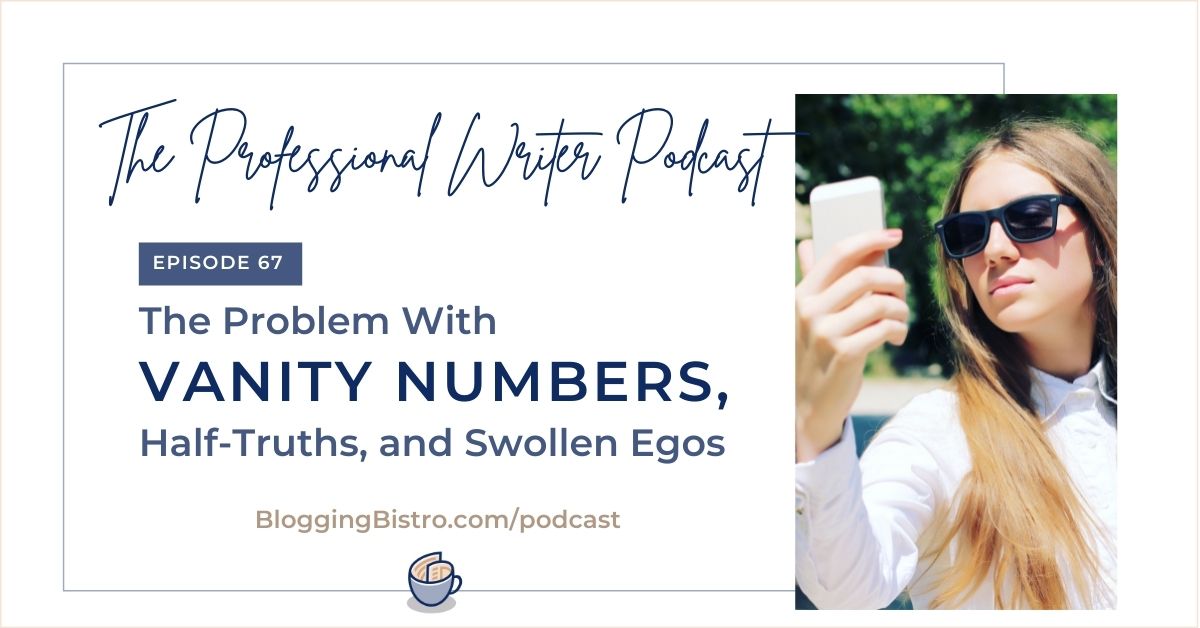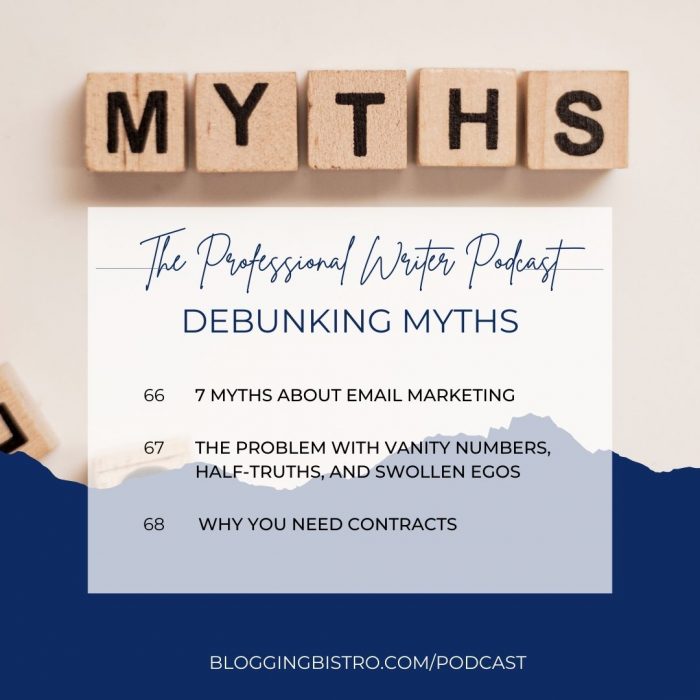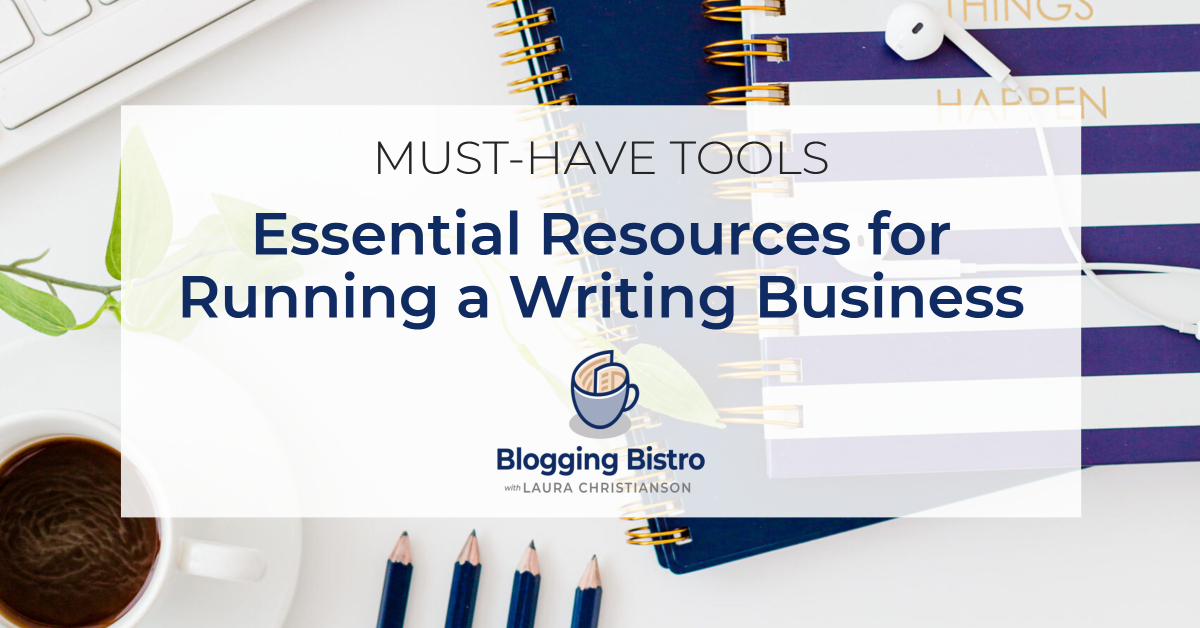67 – The Problem with Vanity Numbers, Half-Truths, and Swollen Egos

I’m going to share a portion of my author bio with you:
Award-winning author, Laura Christianson, wrote her first novel at age 11, and she’s been cranking out prose ever since.
A child prodigy, Laura taught herself to type on her mom’s manual Olympia typewriter. By the time she took her first typing class in ninth grade, she could accurately type 40 words per minute.
Dedicated to educating others, Laura has spent 30 years in the classroom.
You may be thinking, I didn’t know that about her. That’s impressive! I’m going to run out and buy all Laura’s books!
Or, you may be thinking, “What a stuck-up, self-absorbed braggart! I’ll never buy any book she writes, ever.”
I see this kind of author bio – which I fondly refer to as a “swollen ego” bio – on more than a few author websites and on the backs of their book covers.
The bio I just shared with you is full of half-truths that inflate my skills and experience. Here’s the full truth:
That award I won?
It was a national award for an essay I wrote… when I was in 11th grade.
The first novel I wrote at age 11?
It was four pages long, and through that experience, I learned that I am not a novel writer. I’ve never attempted to write another novel since.
Yes, I have been cranking out prose – which, means “ordinary written or spoken language,” since age 11.
As for calling myself an “author”:
An “author” is defined as someone who writes books, articles, or reports. While I have published three books, most of the prose I’ve gotten paid for writing consists of articles (for me, article-writing pays the bills far better than book writing). Touting myself as an “author” might be stretching the truth just a tad.
I did teach myself to type on my mom’s manual typewriter so I could write that first novel – the four-page one. And I was the fastest and most accurate typist in my beginning typing class in high school. But I’m not sure the child prodigy accolade would hold up in court.
My final line:
Dedicated to educating others, Laura has spent 30 years in the classroom.
Yes, I am dedicated to educating others. And I have spent a lot of time in the classroom. Nineteen of those 30 years were as a student, K-12, followed by four years of college, followed by two years for my master’s degree.
Then I spent 11 more years teaching English and Journalism. If you add all those years up, they equal 30 years in the classroom.
Plus, I’ve taught at several writers conferences per year since 2004, so if I really felt like stretching the truth, I could throw in 17 more years “in the classroom.”
Laura has spent 47 years in the classroom!
Impressive, huh?
Sure, my swollen ego bio packed with half-truths makes me sound somewhat impressive, but stretching the truth is rarely a good idea.
Ok, it’s NEVER a good idea.
Stretching the truth may cause someone to take a second look at you, to offer you a book contract, or to hire you to work for them.
But then what happens?
This person begins working with you, and they discover that your swollen ego bio is mostly a pack of lies. This may cause them to distrust you or even, to fire you.
In this episode, I’m going to share my thoughts about three additional swollen ego half-truths writers are promoting – and that publishing industry professionals often recommend writers do as a means of building their platform.
This is an important conversation to have, because vanity metrics are a big thing in the publishing industry. At the very least, we need to be aware that vanity metrics exist, and we need to decide whether we think they’re ok or not ok.
What are vanity metrics?
Similar to my swollen ego bio, vanity metrics are overblown numbers of followers or subscribers. They’re grandiose statements we make about ourselves in an attempt to appear more enticing to agents, editors, publishers. Or whoever we’re trying to impress.
Vanity Metric #1:
Social Media Followers
A few years ago, when I was a social media manager, I had thousands of followers on my Instagram account. I got in when the going was good… when we could quickly amass thousands of followers without even trying.
Because I specialized in social media during that part of my career, I followed a bunch of other social media professionals. I wanted to learn from them and share ideas with them.
But if my intent had been to build a following of people who I wanted to buy from me, I should have primarily followed and interacted with the people I wanted to serve, who were most likely to buy my services.
When I rebranded my business a couple of years ago, I recalibrated my Instagram account. I removed nearly all of the social media managers who were following me, as well as thousands of bots and fake accounts. I unfollowed most of the people I’d been following and began following my ideal audience – writers and authors.
Then I attended an Instagram workshop where the instructor advised that our Instagram ratio of followers-to-following should be 40-to-1. The instructor told us, “For every one person you follow, 40 people should follow you.”
Shocked and dismayed that someone would be disseminating this advice – which I’d never, ever heard from any social media professional during my years as a social media manager – I researched it.
I discovered the industry standard ratio of followers-to-following is 1-to-1 or 1-to-2. The 1-to-2 ratio indicates that, for every one person you follow, two people will follow you. Not 40.
One-to-two sounds more reasonable and doable than 1-to-40, doesn’t it?
As I sat through that workshop, I felt distressed for the pre-published authors in the room. I wondered, “How is a new author who’s starting from zero and whom no one has heard of going to entice 40 people to follow them when they follow only one of those people in return?”
They’re not.
And the author is going to feel like “less than” because they won’t be able to achieve the 40-to-1 ratio that somebody told them you’re “supposed” to have.
While I’m not a big Instagram user, I do follow the trends closely and I watch what others are doing to grow their following. One thing I know: Instagram users are obsessed with follower counts.
They have bought into the lie that the more followers they have, the better.
The more followers they have, the more popular and desired they are.
The more followers they have, the more likely they are to get featured in the media, land book deals, sell stuff, and begin living “the laptop lifestyle,” where they work five hours a week from a laptop while basking in the sun on a tropical island.
When they buy into this lie, they become determined to get those tens of thousands of followers however they can.
Massive Action Step
If you’re an Instagram user who’s trying to grow your following, take a close look at who follows your Instagram account, and at who you follow.
If you haven’t done this recently, I guarantee it’ll be an eye-opener. I recently did this for a client whose Instagram account I took over the management of. They had thousands of followers. I went through each follower, one-by-one (because that’s the only way you can currently do it on Instagram). I discovered that 90% of their followers were either bots, fake accounts, or inactive accounts.
Their account had zero interaction with its followers because the so-called followers weren’t even real people! Or they were people who hadn’t logged in to their Instagram accounts in three years!
I removed all the followers I could clearly identify as bots, or as inactive.
Guess what happened?
The reach and interaction rates of my client’s Instagram account skyrocketed after about two weeks.
You may argue, “Well, I heard a literary agent say that you should have 10,000 or 20,000 followers on social media before a publisher will even think of offering you a contract.”
I hate it when they say this!
I talked about this topic in relation to email subscribers in my previous episode – episode 66, where we debunked 7 myths about email marketing.
While follower numbers in the tens or hundreds of thousands sound enticing to a publisher, numbers alone do not guarantee book sales.
I could spend $10,000 in Facebook and Instagram ads and add 10,000 followers to my Instagram account or Facebook page today. But chances are, those followers would have no intention of ever buying anything from me. I might as well have burned the $10,000 in the fireplace.
This obsession many writers and publishers have with follower numbers is magical thinking.
There’s no magic number of followers you need that will guarantee book sales.
Yeah, big numbers look good to a publisher, but are they the right numbers?
Are those tens of thousands of followers bots? Fake accounts? People who haven’t posted on Instagram for over a year? Followers you’ve bought?
Or are they people who actually care about your writing and are loyal fans?
The only metric that matters is the last one: people who are your loyal fans. People who are the best fit for what you have to offer and the unique way in which you serve them.
I’ve observed many hard-working authors who labor diligently to grow their platform day after day, year after year, and they amass 4,000-to-6,000 Facebook page followers. Even many best-selling authors of 30+ books rarely have as many as 30,000 Facebook followers. The ones who do have been actively building their following for over a decade.
My suggestion, particularly when it comes to social media followers, is to follow the lead of the hard-working authors. If you view writing and publishing as a career, you’ll devote time each day, every day, to connecting with your ideal readers.
You may never reach 10,000 or 50,000 followers, which means you might never land that hoped-for contract with a major publishing house. But there are likely some small publishers out there for whom your writing will be a great fit – publishers that have more realistic expectations about follower numbers.
Don’t write off these small publishers. While the advance they pay you will likely be smaller than a big-name publisher, and your book likely won’t get as much distribution, it will at least have a chance of getting published.
And, if you’ve been diligently working on building relationships with your ideal readers, you will have the opportunity to get your writing into the hands of the people who need to read it.
Vanity Metric #2:
Platform Plugins
Another vanity metric that’s intended to impress is a “platform plugin” that’s displayed on an author’s website.
This plugin lists the number of Facebook, Twitter, Instagram, LinkedIn, etc., followers you have. It lists how many email subscribers you have, how many people read your blog posts, and how many people listen to your podcast.
The plugin adds all those numbers together so that agents, publishers, and other visitors to your website will be impressed when they see that you have a “combined reach” of over 100,000 people (or 500,000, or 1 million – fill in the blank).
The problem with this means of “social proof” (demonstrating or proving that you have a huge social media following), is similar to Instagram vanity metrics.
Let’s say you started a Twitter account in 2006. Because you began using Twitter back in the early days, when it was super-easy to build a huge following, you have 20,000 Twitter followers.
However, you haven’t tweeted since 2015. But hey, you’ve still got those 20,000 followers that you can add to your platform plugin and people will assume they’re legit followers.
You can post vanity metrics via a “platform plugin” till the cows come home, but there’s only one person in the world who knows whether those numbers accurately reflect your fan base. That person is you.
My question for you: Just how accurate are those platform numbers?
Here’s a common scenario concerning platform plugins:
If I have liked your Facebook page, followed you on Twitter and Instagram, and I subscribe to your email list, do I count as four followers?
Is it ethical to count me four times (and to count everyone else who follows you on several social channels multiple times)?
What’s your motivation for showcasing your platform numbers?
- Are you doing it to boost your self-esteem?
- To impress agents and publishers and readers and prospective clients?
There’s nothing inherently wrong with displaying your platform numbers. Just be aware that it is a vanity metric, and one that could be highly inaccurate, depending on how diligent you are about removing inactive followers and subscribers.
You want the numbers you showcase to reflect your actual following as accurately as possible.
Vanity Metric #3:
Best-Selling, Award-Winning Author
Many, many authors describe themselves as a “best-selling author,” or an “award-winning author,” or a “best-selling, award-winning author.”
I’ve seen these monikers on hundreds of book covers, on author websites, in author bios, in email signatures, and in promotional messages. Some speakers at writers conferences advise authors to plaster “best-selling, award-winning” everywhere possible.
There’s nothing wrong with tooting your horn and letting people know you have street cred.
However, here’s what I see quite often – even among those in Christian publishing – and this concerns me:
An author who sells their book on Amazon reaches #1 for 10 minutes in some obscure category-within-a-category.
For example, their book hits #1 in the Military Technology category, which is a sub-category of Engineering & Transportation books, which is a sub-category of Non-fiction books.
Considering there are only eight books, total, in the entire Military Technology category, your book could technically reach Amazon best-seller status if you sold only one copy.
The author whose book was #1 for a few minutes in an obscure category could claim it is an “Amazon best-seller.”
I talked about this recently with an author. One of their books landed on a “Big 4” most prestigious best-seller list. Those lists include:
- New York Times
- Publishers Weekly
- USA Today
- The Wall Street Journal
This author’s previous books had appeared on other, less prominent best-seller lists, but the author told me they didn’t feel comfortable announcing that their book was a “best-seller” until it made one of the Big 4 lists.
I admire this author’s integrity.
While they could have easily claimed the title, “best-selling author” several books ago, they set boundaries and waited to call themselves a “best-selling author” until they felt as if they could truly live into this title.
Award-Winning Author
I see the “award-winning author” tagline so often that I think every author must be an award-winning author.
This tagline is the most problematic for me, because I know (from experience judging writing contests) that many contests get only one or two entrants, or they charge an entry fee, or both.
Combine a low number of entrants with an entry fee and a rinky-dink award that someone invented, and you have a recipe for a poorly-written book winning first prize and the author suddenly thinking they “have arrived.”
I also know, from experience working with many authors who have won awards (and not won awards), that the judging criteria for many contests – even big, well-known contests – is incredibly subjective, that some judges aren’t qualified to judge certain genres of writing, and that political clout plays a significant role in who wins.
For example, three finalists were announced for a well-known, nationwide writing contest in which traditional publishing houses nominated several of their authors in various genres. I read the books of all three finalists in a particular category, and it was obvious to me which book would win, as it was hands-down the best-written, most carefully crafted, intriguing book among the three finalists. It was so clearly the winner that I thought anyone with half a brain would surely pick it.
The book didn’t win.
After the contest, the author of the book that I thought would win, but didn’t win, contacted me (I didn’t know this author until they contacted me, so I felt my judgment of the three books had been as non-biased as it could be).
I told the author I had enjoyed their book and was disappointed it hadn’t won the award.
The author agreed that they were disappointed, and then confided, “Frankly, I didn’t expect it to win. This contest has a reputation that books published by the biggest-name publisher usually win, and that’s exactly what happened.”
In other words: Big money. Big clout. Your author wins!
Similar to identifying yourself as a “best-selling author” when your book has sold 1000 copies, think carefully about identifying yourself as an “award-winning” author if you paid to enter an obscure writing contest for which there were only a handful of entries.
The Slippery Slope
I share my thoughts about vanity numbers because it’s so easy to get sucked into platform-building practices that can become deceitful unless managed extremely carefully. We need more awareness and transparency around the topic of vanity numbers.
My suggestion:
Set your standards. Establish your boundaries. Stick by them.
Err on the side of integrity.
Focus less on collecting huge numbers of followers and more on connecting with the followers you already have, and the ones you will have in the future.
Debunking Myths Mini-Series
Here are links to the other two episodes in this mini-series:
Episode 66: 7 Email Marketing Myths
Episode 68: Why You Need Contracts
How to Keep Up With the Show
Click here to join my my email list and I’ll notify you about every episode. (When you subscribe, you’ll also get my free guide, Essential Resources for Running a Writing Business.)
Join The Professional Writer Podcast Community (private Facebook group), where we discuss what we’re learning, meet our guests, and encourage one another on our writing journeys.
If you know a writer who would be interested in The Professional Writer Podcast, please share this link with them:
https://bloggingbistro.com/podcast
Thank you!
Laura



